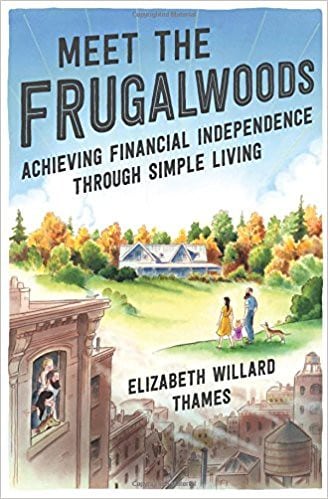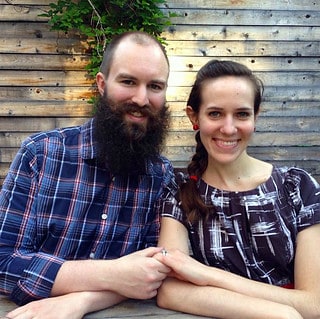Book review: Meet the Frugalwoods

From time to time, somebody will publish a book like David Chilton's The Wealthy Barber, which provides financial advice in the guise of a story, but these attempts are very, very rare. (It's a bit ironic that one of the oldest, most revered personal finance books — The Richest Man in Babylon — is story based, yet few have followed in its footsteps.)
All this is to say: For years, I've believed there's a hole in the market waiting to be filled, a place for a story-based book about money.
Enter Meet the Frugalwoods, the brand new book from Elizabeth Willard Thames. Liz writes the excellent Frugalwoods blog, which chronicles her young family's experience with extreme frugality. (Her site also documents their adventures owning a 66-acre homestead in rural Vermont, a subject I love.)
Meet the Frugalwoods isn't a money manual. It isn't fiction. It's memoir. The book covers ten years in the lives of Liz and her husband Nate, from their post-college job-hunting experiences in Kansas to purchasing the afore-mentioned Vermont homestead.
Through their story, Liz shows readers it's possible to move from a life of consumerism to a life built around frugality and purpose.
In some ways, the book seems to contradict the blog. On the blog, Liz maintains that she and Nate have always been savers: “Mr. Frugalwoods and I have always been frugal — it’s just how we’re wired.” In the book, she paints a picture of a couple that succumbs to run-of-the-mill American consumerism before being liberated by a philosophy of extreme frugality.
A Regular Middle-Class Lifestyle
After graduating from the University of Kansas in 2006, Liz and Nate experienced typical young adult struggles. While he got job using the skills he'd developed, Liz struggled to find work that made use of her degrees in political science and creative writing. As a stop-gap measure, she took a position preparing files for digitization in a document scanning center. (This reminds me of the worst job I ever had, selling insurance door to door after I graduated from college. Haha.)
In a quest for more meaningful work, Liz took a position with AmeriCorps in New York City. Her job was to raise money for a small non-profit organization. The experience was formative. It taught her the essence of extreme frugality. (Her monthly food budget was her $120 food stamp allotment. She ate on four dollars per day!) Still, she managed to save $2000 of her $10,000 annual salary.
Liz lived in the Crown Heights neighborhood of Brooklyn, where people were poor and struggled to get by. During the day, however, she hobnobbed with billionaires, seeking contributions to her non-profit. It was a jarring juxtaposition.
In time, she moved to Boston to be with Nate (who had found work there as a computer programmer). She found a job doing fund-raising for WGBH, Boston's public broadcasting station. They fell into a regular middle-class lifestyle, complete with lifestyle inflation.
I was promoted to senior development associate, accompanied by a raise, and decided to start getting my hair cut at a chic salon in Harvard Square that a woman in my office recommended. They massaged my neck, brought me herbal tea, washed my hair, cut and styled it, for just $120. The fact that I used to eat for an entire month on that same dollar amount didn't register at the time. I worked hard, so I reasoned I deserved to treat myself. What was the point of this job otherwise?
Over the next few years, Liz and Nate moved to Washington, D.C. — and then back to Boston. Liz went back to school to get a masters in public administration. They bought a house. They got a dog. From the outside, everything seemed rosy. On the inside, however, it felt like something was missing.
“We stopped micromanaging our spending,” Liz writes. “By which I mean I had no clue what we spend in any given week, month, or year.” But the increased spending didn't bring increased happiness.
Now that I'd experienced a life of spending $40 a week on artisanal cheeses and $120 on haircuts and $200 on dinners out, I realized it wasn't what I wanted. What was the point of being able to buy whatever I wanted if I didn't control my time?
Something had to give.
An Epiphany (or Two)

Although this small epiphany led the couple to spend more time outdoors (and to question their consumer tendencies), they still had a few years to go before they'd experience their big breakthrough.
On 29 March 2014, Liz and Nate agreed to discard the life they were building and move to the woods instead. They crunched the numbers. If they embarked on a crusade of extreme frugality, they figured they could be financially independent by 2017. And when they achieved financial independence, “we'd have enough money to move to a homestead in the woods-filled countryside of Vermont.”
They dove into extreme frugality with gusto.
On their quest to squash as many expenses as possible, Liz and Nate employed a variety of methods.
- They used barter and trade, exchanging goods and services. When Liz decided she couldn't live without yoga, for instance, she trained to become an assistant at the studio she attended. In exchange for her time, she saved $288 in class fees every month.
- They became masters of DIY. With the internet at their side, Liz and Nate learned to remodel their home, repair and upgrade appliances, and give each other haircuts.
- They became Craigslist masters, patiently waiting for the things they wanted and needed to be offered for cheap. This saved them big bucks on furniture — and more.
- They started salvaging — or “rescuing”, as Liz puts it — used items, such as lamps and dressers set out for trash pick-up.
“These types of frugal substitutions and alternatives were all around us,” Liz writes. “We marveled at everything we'd been unwittingly overpaying for. By bringing creativity and ingenuity to our consumption, we were able to drastically reduce our overall spending.”
She continues:
I don't think the route to successful frugality entails brutally slashing everything from your budget, because you're bound to end up in that deprived state…Rather, the key is to identify less expensive options that'll yield the same or a similar end result. Thus, you end up not feeling deprived, you save a boatload of money, and you are then motivated to find more opportunities for dramatic changes…
And then she makes what I consider the most important point of the entire book: “Since we were working toward an ever-crystallizing goal of decamping to the woods, frugality wasn't about what we were giving up; it was entirely about what we were going to gain.”
Exactly.
Finding Freedom
In Twilight of the Idols, Friedrich Nietszche wrote, “He who has a why to live for can bear almost any how.” This is why I'm so insistent that GRS readers take some time to think about what they want out of life, to craft a personal mission statement.
Their new-found frugality allowed Liz and Nate to regain control of their lives. “Frugality gave us options,” she writes. The less they spent and the more they saved, the more control they had over their destiny. She continues:
It's a virtuous cycle of low spending and high saving that's self-perpetuating. The less money you need to live on, the more you save, and the less you need to earn.
The next two years brought a lot of changes. Rather than resenting the process of extreme frugality, they found that they enjoyed it. (“Like, a lot.”) They began prepping their Boston home to act as a future rental property. They diligently scoured the Vermont real estate listings, hunting for suitable properties. And they welcomed the birth of their first child.
Along the way, they documented their experience at a blog they dubbed Frugalwoods.
In late 2015, after just over eighteen months of saving, Liz and Nate toured an almost-perfect property. Located on 66 acres in central Vermont, it was close enough to civilization that they'd have access to everything they needed (and wanted). It wasn't crowded by neighbors, was wired for high-speed internet, and included lots and lots of trees. They bought the place. In January 2016, they moved in.
Liz and Nate's story is inspiring. I like reading how people find purpose, then restructure their lives to achieve their goals. And I like reading about evolving relationships with money. “Money doesn't make you happy,” Liz writes in Meet the Frugalwoods, “but money provides the freedom to find out what does make you happy.”

A Missing Piece to the Puzzle
Meet the Frugalwoods isn't perfect. To my mind, it's too much of a memoir and not enough of a money manual. Because it's so much about Liz and Nate's story, there's very little information on how others can do what they did. In some ways, it seems like a black box: “Cut back on spending for 21 months and you can buy a farm in Vermont!” Obviously, there's much more to the process than that.
“There are actually only three variables in the financial independence equation: income, expenses, and time,” Liz writes. Yes! She talks some about time in Meet the Frugalwoods, but the rest of the book is all about expenses. The book focuses far too much on “defense” (expenses) and not enough on “offense” (income). In fact, there's nothing about income here. It's like giving a recipe for baking bread but failing to mention you need yeast.
Liz doesn't share detailed income and spending numbers after 2008 (at which time they were earning $69,730 take-home), but it's clear that their household income grew quickly from these entry-level positions. Despite a consumer lifestyle, she and Nate were still able to save a ton.
Before they began their excursion into extreme frugality, while they were enjoying $120 haircuts and $200 restaurant meals, the couple was already saving between 40% and 50% of their after-tax income (and that doesn't even count maxed-out 401(k) contributions and mortgage principal!). Once they kicked their frugal efforts into high gear, their saving rate peaked at 82%. (According to the blog, their saving rate was over 93% if you count 401(k) contributions.) They were able to achieve financial independence in just over eighteen months.
Liz and Nate embarked on their adventures into extreme frugality on 29 March 2014. They submitted an offer for their Vermont homestead on 23 November 2015 (and closed the deal on 15 January 2016). That's a pretty quick turnaround.
The only real acknowledgement of the role income played in the process comes during the book's introduction: “In order to save large amounts of money, you have to have a sufficient amount of money coming in,” Liz writes. “You can't frugalize income you don't earn.” That's great, but it comes in the midst of a seven-page apology for “privilege” and not in the meat of the book. I think it's a vitally important point, and the fact that the subject is wholly missing from Meet the Frugalwoods is a mystery to me.
Tell us more! Give us details! Show us how others can do the same thing! There's no shame in earning a lot of money. Why hide it?
A little sleuthing turned up some numbers from which we can make some extrapolations. According to this Forbes article, during 2014 Liz and Nate spent $13,000 on non-mortgage expenses and their mortgage payments amounted to around $24,000. Because their saving rate was 71%, that means this $37,000 represents 29% of their take-home pay. Plus they maxed out their 401(k)s, which is another $35,000. More math shows that the Frugalwoods' after-tax income was probably around $162,000 in 2014 and they were able to save in the neighborhood of $125,000. Nice!
The Bottom Line
Look, my complaint about the lack of income info isn't meant as a knock against Liz. She's one of my favorite people in the financial blogging universe. What it does mean, however, is that the target audience for this book is not a person struggling to get by on a low salary, which is what you'd typically expect the readership of a frugality book to be. (If that describes you, check out Your Playbook for Tough Times by Donna Freedman.)
If you're in a two-income household with typical salaries, however, you can apply the book's lessons (perhaps on a smaller scale) to pursue your goals. And if, like Liz and Nate, you're well-educated with high incomes, you can absolutely achieve financial independence in a short time — if you're willing to make the short-term sacrifices necessary to get there.
Meet the Frugalwoods is a welcome addition to the ever-expanding library of personal finance literature. It covers a relatively new topic (financial independence) in a relatively new way (story). Liz and Nate's story will be relatable for many people. It's my hope that through her experience, she'll help a lot of new folks discover the path to financial freedom.
Become A Money Boss And Join 15,000 Others
Subscribe to the GRS Insider (FREE) and we’ll give you a copy of the Money Boss Manifesto (also FREE)
